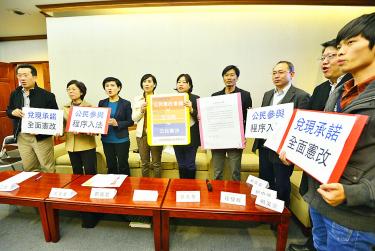Civic groups plan to push for “bottom-up” constitutional reforms and prepare constitutional amendment proposals for referendums by 2018, the Civic Alliance to Promote Constitutional Reform said yesterday.
The alliance, which was formed in 2014, told a news conference that its efforts would focus on two issues — lowering the voting age and reducing the threshold of the minimum percentage of votes a party must receive to be apportioned legislator-at-large seats.
According to the alliance, members of the public and legislators are to be jointly involved in the drafting of constitutional amendment proposals, which are to be submitted to popular referendum to coincide with the 2018 local elections for county commissioners and city mayors.
The drafting process is to be split into three stages: research, consultation and deliberation, the alliance said.
Hsu Wei-chun (徐偉群), a member of the alliance’s executive committee, said that its goals are to enlist the legislature in jump-starting constitutional reforms, to have members of the public and lawmakers work together in overcoming the stringent legal threshold for constitutional referendums, and to use action to improve the awareness of the nation as a “constitutional and political community.”
Taiwan Alliance for the Advancement of Youth Rights and Welfare secretary-general Yeh Da-hua (葉大華) said the Chinese Nationalist Party’s (KMT) obstruction in the legislature in July last year defeated proposals to amend the minimum voting age and the percentage threshold in votes to elect legislators-at-large, despite a national consensus supporting such proposals.
As Democratic Progressive Party (DPP) Chairwoman Tsai Ing-wen (蔡英文) has been elected as the next president, she now has a duty to carry through her campaign promises to support those constitutional amendments, Yeh added.
Lawmakers at the news conference said they would support the proposed constitutional amendments in the legislature.
DDP Legislator Cheng Li-chun (鄭麗君) said that as a constitutional amendment committee member present during the breakdown in negotiations last year, she blames the KMT and the “top-down” approach to amending the Constitution for the failure to ratify the two proposals.
A “bottom-up” strategy proposed by the alliance has a better chance of breaking the gridlock of political elites and their concerns for political self-interest by relying on deliberative democracy to open a path, Cheng said.
DPP Legislator Yu Mei-nu (尤美女) said she considers the alliance’s plan “innovative,” adding that she would support it in the legislature, while New Power Party Legislator Kawlo Iyun Pacidal also pledged to support the proposed amendments.
DPP Legislator Chen Chi-mai (陳其邁) said past efforts to introduce “top-down” constitutional reforms through the legislature did not produce the results the people wanted, adding that he supports the spirit and institutional framework of the alliance’s plan, adding that he believes there is also “room for discussion on its procedural matters.”
Source: Taipei Times - 2016/03/16





















